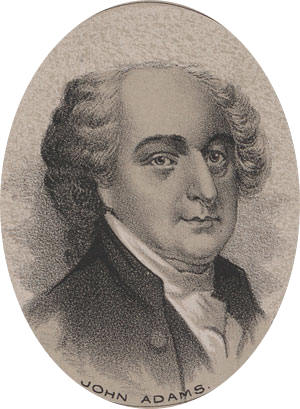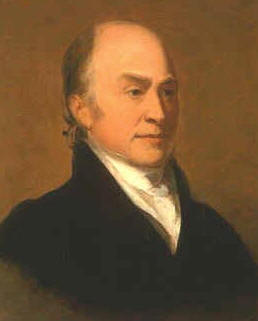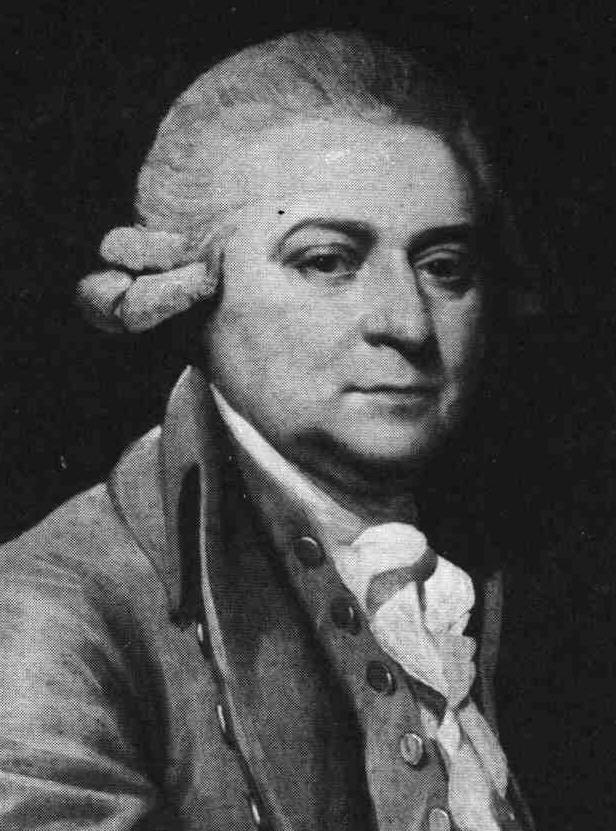 John Adams
John Adams
Our Second President

 John Adams
John Adams
Our
Second President
Brilliant lawyer and diplomat with a mind very clear,
Through Congress did Adams our declaration steer.
The general principles upon which the Fathers achieved independence were the general principles of Christianity…I will avow that I believed and now believe that those general principles of Christianity are as eternal and immutable as the existence and the attributes of God.
June 28, 1813; Letter to Thomas Jefferson
John Adams, younger cousin of Samuel Adams, directly descended from Henry Adams who fled from the persecutions in England during the reign of the first Charles. His maternal ancestor was John Alden, a passenger on the Mayflower. Archbishop Laud, the spiritual adviser of Charles I [from whom John Adams' ancestor fled] enforced the strictest observance to requirements of the established Church. Anyone not conforming was severely dealt with, and these punishments drove away many to the new world, where they could serve God according to their beliefs. Benson J. Lossing, Signers of the Declaration of Independence, George F. Cooledge & Brother: New York (1848) [reprinted in Lives of the Signers of the Declaration of Independence, WallBuilder Press: Aledo, Texas (1995)], pages 27-28.
John Adams was raised a Congregationalist and became a devout Unitarian, which was a non-trinitarian Protestant Christian. His education began in a common school in Braintree, and he later secured a scholarship to Harvard. After graduating, he apprenticed and was admitted to the Bar in 1761. He fought actively against the Stamp Act; and later he surprised many people and stirred controversy when he defended the British soldiers accused of murdering Crispus Attucks at the Boston Massacre. "Facts are stubborn things; and whatever may be our wishes, our inclinations, or the dictates of our passions, they cannot alter the state of facts and evidence."
Some
highlights from his career include his being elected to Massachusetts Assembly,
1770, attended First Continental Congress, 1774-'76 where he signed the Declaration of
Independence. He was appointed Diplomat to France, 1776-'79, was member of
assembly to form the State Constitution of Massachusetts, was first Vice President,
1789, and second President, 1796.

Like Jefferson, he recognized the abuses that religious belief lends itself to, but he knew that religion, by uniting and morally guiding the people, had a role in public life. "Without Religion this World would be Something not fit to be mentioned in polite Company, I mean Hell." John Adams to Thomas Jefferson, April 19, 1817. In his autobiography, Benjamin Rush wrote of Adams, "He was strictly moral, and at all times respectful to Religion. In speaking of the probable issue of the war he said to me in Baltimore in the winter of 1777, 'We shall succeed in our struggle, provided we repent of our sins, and forsake them,' and then added, 'I will see it out, or go to heaven in its ruins.' He possessed more learning probably, both ancient and modern, than any man who subscribed the Declaration of Independence. His reading was various."
Repent ye therefore and be converted that your sins may be blotted out.
Acts 3:19
John Adams died on July 4, 1826, during the presidency of son John Quincy Adams. Except for Charles Carroll, who lived until 1832, Adams, along with Jefferson, was one of the last two surviving signers. His final toast to the Fourth of July was "Independence Forever!" http://www.ushistory.org/declaration/signers/index.htm
[July 4th] ought to be commemorated as the day of deliverance by solemn acts of devotion to God Almighty.
in letter written to Abigail on the day the Declaration was approved by CongressWe have no government armed with power capable of contending with human passions unbridled by morality and religion. Avarice, ambition, revenge, or gallantry, would break the strongest cords of our Constitution as a whale goes through a net. Our Constitution was made only for a moral and religious people. It is wholly inadequate to the government of any other.
October 11, 1798
I will insis
t that the Hebrews have done more to civilize men than any other nation. If I were an atheist, and believed in blind eternal fate, I should still believe that fate had ordained the Jews to be the most essential instrument for civilizing the nations. If I were an atheist of the other sect, who believe or pretend to believe that all is ordered by chance, I should believe that chance had ordered the Jews to preserve and propagate to all mankind the doctrine of a supreme, intelligent, wise, almighty sovereign of the universe, which I believe to be the great essential principle of all morality, and consequently of all civilization.
Letter to François Adriaan van der Kemp (16 February 1809)
 To
John and Abigail was born John Quincy Adams, our sixth President.
To
John and Abigail was born John Quincy Adams, our sixth President.
When it was feared that Christian influence was waning in New England, John Quincy Adams prepared a lecture on Truth, which he delivered in many places. The premise was: "A man to be a Christian must believe in God, in the Bible, in the Divinity of the Savior's mission, and in a future state of rewards and punishments."
His inaugural address as President in 1825 closed with these words:
Knowing that 'except the Lord keep the city, the watchman waketh but in vain,' with fervent supplications for His favor, to His overruling providence I commit, with humble, but fearless confidence, my own fate, and the future destinies of my country.
John Quincy Adams was the only President to have ever been elected to serve
as a congressman after his term as President was completed. In being nominated
for this position he said: "Not in my opinion would an ex-President of the
United States be degraded by serving as a selectman of his town, if elevated
thereto by the people." During his time of service as a
Representative from Massachusetts he presented petitions for the abolition of
slavery to Congress. In October 1837, he addressed his situation in his
diary: I have gone as far upon this article, the abolition of slavery, as the
public opinion of the free portion of the Union will bear, and so far that
scarcely a slave-holding member of the House dares to vote with me upon any
question."
At this same time Adams became personally involved in buying
the freedom of a slave woman and her two children, whose fates were in the hands
of a notorious Alexandria, Virginia, slave trader named James H. Birch. Toward a
subscription to purchase their freedom, Adams contributed what little he could
spare, fifty dollars. http://www.americanrevolution.com/ppl_adams_quest_2.html
On another occasion, he presented a petition against the annexation of Texas as a slave state, which was signed by several women. When these women were rebuked by Representative Howard from Maryland for turning from their domestic duties, Adams countered:
Are women to have no opinions or actions on subjects relating to the general welfare? Where did the gentleman get this principle? Did he find it in the sacred history (the Bible) - in the language of Miriam the prophetess, in one of the noblest and most sublime songs of triumph that ever met the human eye or ear? Did the gentleman never hear of Deborah, to whom the children of Israel came up for judgment? Has he forgotten the deed of Jael, who slew the dreaded enemy of her country? Has he forgotten Esther, who by her petition saved her people and her country?
From American Christian Rulers, Rev. Edward J. Gidding (New York: Bromfield & Company, 1890) http://www.eadshome.com/JohnAdams.htm http://forerunner.com/forerunner/X0205_John_Quincy_Adams.html
O
n February 2, 1806, Reverend James Laurie, pastor of a Presbyterian Church that had settled into the Treasury Building, preached to an overflow audience in the Supreme Court Chamber, which at the time was located on the ground floor of the Capitol. John Quincy Adams was in attendance.
Peter Roberts, "John Adams" page in "God and Country" section of
"Science Resources on the Net" website (http://www.geocities.com/peterroberts.geo/Relig-Politics/JohnAdams.html;
viewed 23 November 2005):
http://www.adherents.com/people/pa/John_Adams.html
Robert G. Ferris (editor), Signers of the Declaration: Historic
Places Commemorating the Signing of the Declaration of Independence,
published by the United States Department of the Interior, National Park
Service: Washington, D.C. (revised edition 1975), page 35:
http://www.eadshome.com/QuotesoftheFounders.htm
http://en.wikiquote.org/wiki/John_Adams
http://www.whitehouse.gov/history/presidents/ja2.html
Adams, John
A Congressman's prayer
by John Quincy Adams
Almighty Father! look in mercy down;
Oh! grant me virtue, to perform my part--
The patriot's fervour, and the statesman's art
In thought, word, deed, preserve me from thy frown.
Direct me to the path of bright renown
Guide my frail bark, by truth's unerring chart,
Inspire my soul, and purify my heart;
And with success my stedfast purpose crown.
My country's weal--be that my polar star--
Justice, thou Rock of Ages, is thy law--
And when thy summons calls me to thy bar,
Be this my plea, thy gracious smile to draw--
That all my ways to justice were inclin'd--
And all my aims--the blessing of mankind.
Image of Adams by Ole Erekson, Engraver, c1876, Library of Congress
By the President of the United States of America
A PROCLAMATION - 1798
AS the safety and prosperity of nations ultimately and essentially depend on the protection and blessing of Almighty God; and the national acknowledgment of this truth is not only an indispensable duty which the people owe to Him, but a duty whose natural influence is favorable to the promotion of that morality and piety, without which social happiness cannot exist, nor the blessings of a free government be enjoyed; and as this duty, at all times incumbent, is so especially in seasons of difficulty and of danger, when existing or threatening calamities, the just judgments of God against prevalent iniquity are a loud call to repentance and reformation; and as the United States of America are at present placed in a hazardous and afflictive situation, by the unfriendly disposition, conduct and demands of a foreign power, evinced by repeated refusals to receive our messengers of reconciliation and peace, by depredations on our commerce, and the infliction of injuries on very many of our fellow citizens, while engaged in their lawful business on the seas: —Under these considerations it has appeared to me that the duty of imploring the mercy and benediction of Heaven on our country, demands at this time a special attention from its inhabitants.
I HAVE therefore thought it fit to recommend, that Wednesday, the 9th day of May next be observed throughout the United States, as a day of Solemn Humiliation, Fasting and Prayer; That the citizens of these states, abstaining on that day from their customary worldly occupations, offer their devout addresses to the Father of Mercies, agreeably to those forms or methods which they have severally adopted as the most suitable and becoming: That all religious congregations do, with the deepest humility, acknowledge before GOD the manifold sins and transgressions with which we are justly chargeable as individuals and as a nation; beseeching him, at the same time, of his infinite Grace, through the Redeemer of the world, freely to remit all our offences, and to incline us, by his holy spirit, to that sincere repentance and reformation which may afford us reason to hope for his inestimable favor and heavenly benediction; That it be made the subject of particular and earnest supplication, that our country may be protected from all the dangers which threaten it; that our civil and religious privileges may be preserved inviolate, and perpetuated to the latest generations; that our public councils and magistrates may be especially enlightened and directed at this critical period; that the American people may be united in those bonds of amity and mutual confidence, and inspired with that vigor and fortitude by which they have in times past been so highly distinguished, and by which they have obtained such invaluable advantages: That the health of the inhabitants of our land may be preserved, and their agriculture, commerce, fisheries, arts and manufactures be blessed and prospered: That the principles of genuine piety and sound morality may influence the minds and govern the lives of every description of our citizens; and that the blessings of peace, freedom, and pure religion, may be speedily extended to all the nations of the earth.
And finally I recommend, that on the said day; the duties of humiliation and prayer be accompanied by fervent Thanksgiving to the bestower of every good gift, not only for having hitherto protected and preserved the people of these United States in the independent enjoyment of their religious and civil freedom, but also for having prospered them in a wonderful progress of population, and for conferring on them many and great favours conducive to the happiness and prosperity of a nation.
Given under my hand and seal of the United States of America, at Philadelphia, this twenty-third day of March, in the year of our Lord one thousand seven hundred and ninety-eight, and of the Independence of the said States the twenty-second.
 JOHN ADAMS
JOHN ADAMS